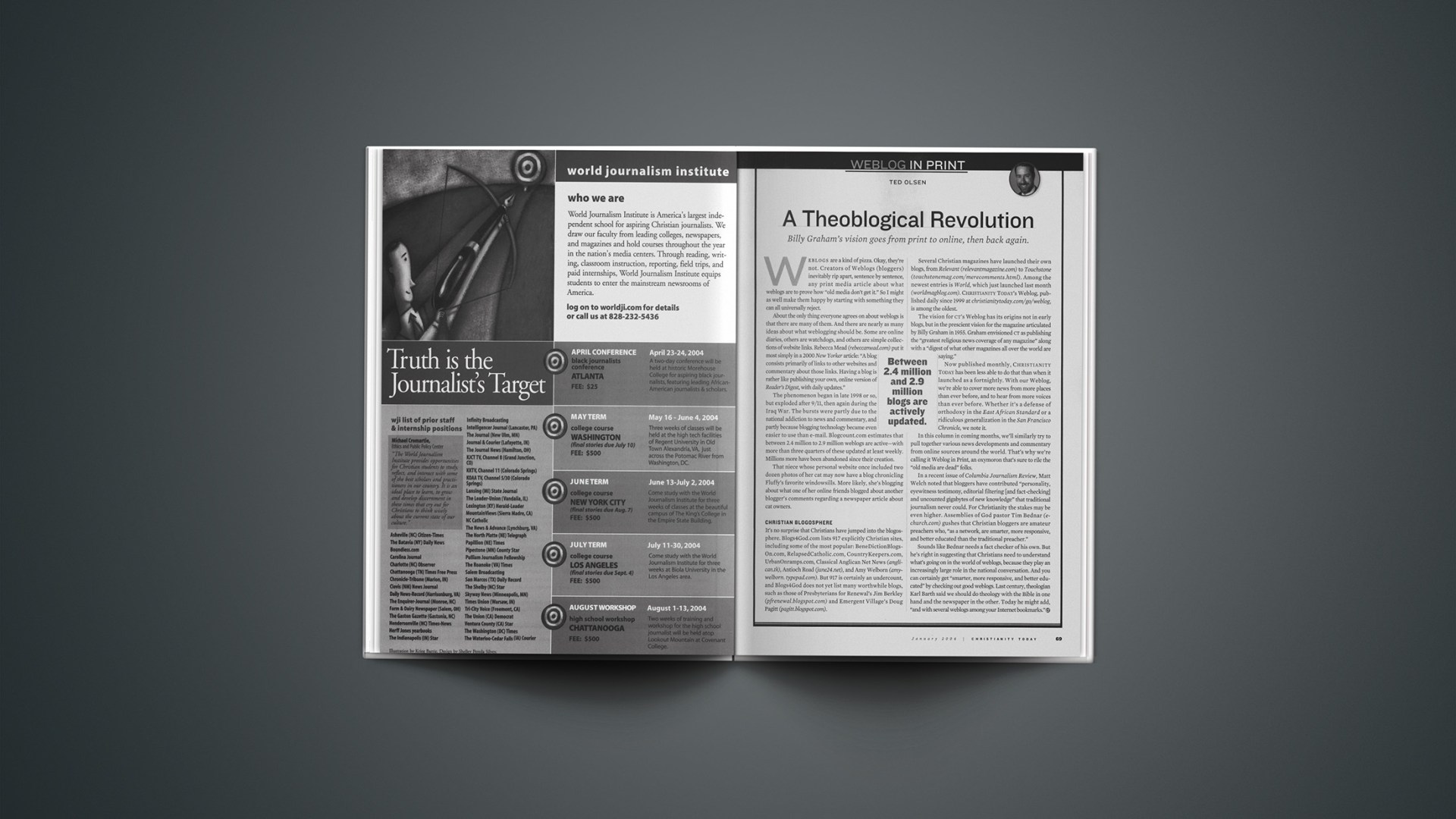Weblogs are a kind of pizza. Okay, they’re not. Creators of Weblogs (bloggers) inevitably rip apart, sentence by sentence, any print media article about what weblogs are to prove how “old media don’t get it.” So I might as well make them happy by starting with something they can all universally reject.
About the only thing everyone agrees on about weblogs is that there are many of them. And there are nearly as many ideas about what weblogging should be. Some are online diaries, others are watchdogs, and others are simple collections of website links. Rebecca Mead put it most simply in a 2000 New Yorkerarticle: “A blog consists primarily of links to other websites and commentary about those links. Having a blog is rather like publishing your own, online version of Reader’s Digest, with daily updates.”
The phenomenon began in late 1998 or so, but exploded after 9/11, then again during the Iraq War. The bursts were partly due to the national addiction to news and commentary, and partly because blogging technology became even easier to use than e-mail. Blogcount.com estimates that between 2.4 million to 2.9 million weblogs are active—with more than three quarters of these updated at least weekly. Millions more have been abandoned since their creation.
That niece whose personal website once included two dozen photos of her cat may now have a blog chronicling Fluffy’s favorite windowsills. More likely, she’s blogging about what one of her online friends blogged about another blogger’s comments regarding a newspaper article about cat owners.
Christian Blogosphere
It’s no surprise that Christians have jumped into the blogosphere. Blogs4God.com lists 917 explicitly Christian sites, including some of the most popular: BeneDictionBlogsOn.com, RelapsedCatholic.com, CountryKeepers.com, UrbanOnramps.com, Classical Anglican Net News (anglican.tk), Antioch Road, and Amy Welborn (amywelborn.typepad.com). But 917 is certainly an undercount, and Blogs4God does not yet list many worthwhile blogs, such as those of Presbyterians for Renewal’s Jim Berkley and Emergent Village’s Doug Pagitt.
Several Christian magazines have launched their own blogs, from Relevant to Touchstone. Among the newest entries is World, which just launched last month. Christianity Today’s Weblog, published daily since 1999, is among the oldest.
The vision for CT‘s Weblog has its origins not in early blogs, but in the prescient vision for the magazine articulated by Billy Graham in 1955. Graham envisioned CT as publishing the “greatest religious news coverage of any magazine” along with a “digest of what other magazines all over the world are saying.”
Now published monthly, Christianity Today has been less able to do that than when it launched as a fortnightly. With our Weblog, we’re able to cover more news from more places than ever before, and to hear from more voices than ever before. Whether it’s a defense of orthodoxy in the East African Standard or a ridiculous generalization in the San Francisco Chronicle, we note it.
In this column in coming months, we’ll similarly try to pull together various news developments and commentary from online sources around the world. That’s why we’re calling it Weblog in Print, an oxymoron that’s sure to rile the “old media are dead” folks.
In a recent issue of Columbia Journalism Review, Matt Welch noted that bloggers have contributed “personality, eyewitness testimony, editorial filtering [and fact-checking] and uncounted gigabytes of new knowledge” that traditional journalism never could. For Christianity the stakes may be even higher. Assemblies of God pastor Tim Bednar gushes that Christian bloggers are amateur preachers who, “as a network, are smarter, more responsive, and better educated than the traditional preacher.”
Sounds like Bednar needs a fact checker of his own. But he’s right in suggesting that Christians need to understand what’s going on in the world of weblogs, because they play an increasingly large role in the national conversation. And you can certainly get “smarter, more responsive, and better educated” by checking out good weblogs. Last century, theologian Karl Barth said we should do theology with the Bible in one hand and the newspaper in the other. Today he might add, “and with several weblogs among your Internet bookmarks.”
Copyright © 2004 Christianity Today. Click for reprint information.
Related Elsewhere:
Weblog appears daily online. A Weblog archive is available online.










